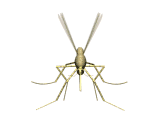 West Nile Virus In Arizona - September 3, 2003 Jeff Schalau, County Director, Agent, Agriculture & Natural Resources Arizona Cooperative Extension, Yavapai County As many of you are aware, the first confirmed case of equine West Nile Virus (WNV) in Arizona was found on the Navajo Nation near Chinle on August 14, 2003. As gardeners (or horse owners), there are many things you can do to minimize mosquito breeding and protect yourself, your family and neighbors, and your animals from WNV. Some recommendations are listed below. However, before these are discussed, I thought I would give you some facts about WNV. WNV is maintained in nature when an arthropod vector (usually a mosquito) transmits the virus between vertebrate hosts (often birds). Humans and horses can be infected by WNV when an infected mosquito takes a blood meal. However, they are considered "dead-end" hosts as they do not contribute to the transmission cycle but can develop an illness as a result of infection. Approximately 20% of humans infected with WNV develop West Nile fever, characterized by flu-like symptoms, mild fever, headache, and body ache. Skin rash and swollen lymph glands may also accompany infection. Symptoms of WNV in humans generally appear within 3-14 days of infection. Some individuals who become infected with the virus (less than 1%) develop encephalitis or meningitis, which is an inflammation of the brain. Symptoms of this disease develop rapidly and may include high fever, headache, muscle weakness, stiff neck, confusion, and coma. This is most common in persons over 50 years of age or those having compromised immune systems. Currently no approved human vaccine is available for WNV. WNV preventative measures include: reducing mosquito breeding areas by eliminating standing water, using floating "donuts" or "dunks" that contain Bacillus thuringiensis v. israeliensis (B.t.i.) which control mosquito larvae in standing water, replacing/repairing screens on doors and windows, mosquito netting, wearing long sleeved shirts and long pants, and the use of mosquito repellents when out of doors. Removing empty beverage containers, discarded tires, or any other item that will hold water will minimize standing water. Buckets, barrels, birdbaths, and other water vessels should be either emptied twice per week or have one of the above-mentioned floating "dunks" placed in it. Mosquito repellents come in many formulations. The active ingredient most often recommended is DEET. Apply mosquito repellents sparingly to exposed skin. The more DEET a repellent contains the longer time it can protect you from mosquito bites. A higher percentage of DEET in a repellent does not mean that your protection is better-just that it will last longer. DEET concentrations higher than 50% do not increase the length of protection. Choose a repellent that provides protection for the amount of time that you will be outdoors. Spray clothing with repellents containing permethrin or DEET since mosquitoes may bite through thin clothing. Do not apply repellents containing permethrin directly to exposed skin. If you spray your clothing, there is no need to spray repellent containing DEET on the skin under your clothing. Place mosquito netting over infant carriers when you are outdoors with infants. Consider staying indoors at dawn, dusk, and in the early evening, which are peak mosquito biting times. Much of the above listed information came from the Center for Disease Control. They have an excellent web site with additional information at: www.cdc.gov/ncidod/dvbid/westnile/index.htm. Local garden centers and feed stores should also be able to order B.t.i. floating "dunks" from their distributors for water features and watering troughs. If not, they are available from various Internet vendors. Always follow label directions when using any pesticide. Horse owners should consult their veterinarian for vaccination recommendations and other information. Naming of companies or products is neither meant to imply endorsement by the author nor criticism of similar companies or products not mentioned. The University of Arizona Cooperative Extension has publications and information on gardening and pest control. If you have other gardening questions, call the Master Gardener line in the Cottonwood office at 646-9113 ext. 14 or E-mail us at mgardener@verdeonline.com and be sure to include your address and phone number. Find past Backyard Gardener columns or submit column ideas at the Backyard Gardener web site: http://ag.arizona.edu/yavapai/anr/hort/byg/. |